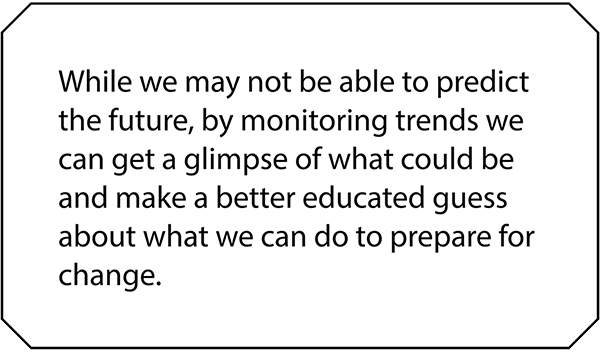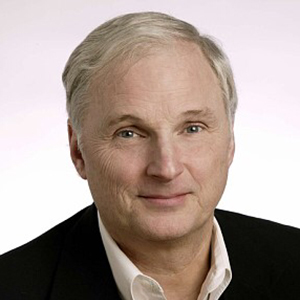
Forward Leadership
By Dennis McMillian
“One cannot manage change. One can only be ahead of it.” – Peter Drucker
Running an organization has never been easy, but today’s business leaders may face the most complex challenges in history. While trend analysis isn’t a perfect science, it may be the best tool we have to stay ahead of change
One example is Moore’s Law on rapidly changing technology. In 1965, Moore observed that the number of transistors in a dense integrated circuit doubled approximately every two years; that trend continues today. Futurists rely on such trend analysis to help leaders better anticipate what may happen.
Modern futurism began in the early 20th century with H.G. Wells’ Anticipations. Since then, we’ve had Alvin Toffler’s Future Shock, John Naisbitt’s Megatrends, and many others providing interesting and at times accurate predictions of where society and technology will go.

One of today’s most noted futurists is Bob Johansen, a senior fellow at The Institute of the Future in Palo Alto, California, who stated in his book Leaders Make the Change: “We are in a time of accelerating disruptive change. In a VUCA world – one characterized by Volatility, Uncertainty, Complexity, and Ambiguity – traditional leadership skills will not be enough.” He and others don’t stop there; they expect the new leader will need to create organizations that are nimble with the ability to quickly adjust as the world around them changes. For business leaders, this rapidly changing and confusing world makes it incredibly hard to be strategic in order to, as Drucker suggests, “be ahead of it.”
First Trend: From Hierarchy to Networked Systems
There will be a transition from strict adherence to traditional hierarchical or siloed structures toward more decentralized, networked systems. Hierarchies depend on well-known practices like the use of policies and procedures to maintain order. Networked systems depend on alignment through a continued focus on a common purpose and the principles required for accomplishing that purpose.
While networked systems are not as well understood, most organizational theorists now see the movement toward this type of organization as inevitable and connected to the need for rapid adaption and transformation. Starting in the ‘60s and ‘70s, corporate leaders like David Packard, founder of HP, and Dee Hock, founder of VISA, experimented with such structures. We now see many more organizations adapting into decentralized structures. We do not suggest that hierarchies will go away, but today’s leaders must understand both emerging structures and traditional hierarchical structures to determine which is best for addressing current challenges.
Second Trend: From Institutions to Movements
With increased usage of networked systems, there will be a shift toward an emphasis on movements and their outcomes rather than on the survival of institutions. There is much evidence of the increased power and impact of movements. With technology, people can virtually connect/partner/create and generate a movement that changes the world – then disband when another is created to address the next big issue.
It has been noted that the millennial generation is the least likely to join or be loyal to institutions. This does not mean that this generation is anti-establishment. It does mean that the almost fierce loyalty expressed by the older generations to one’s employer, religious organization, political party, etc., may be less of a factor with millennial, current, and future generations. What theorists predict is the need for institutions to be built around a movement, rather than a movement coming from an institution. Institutions will come and go with more regularity, and even those that continue will have increasing difficulty with affirming their relevance. Movements, on the other hand, will be more agile and transformative in a VUCA world.
Third Trend: From Hero to Host
Possibly the most important trend is that leaders will have to rely more on their collaborative and adaptive skills to be better suited in these times. In Margaret Wheatley’s Leadership in the Age of Complexity, she refers to the leadership model of the past as the “hero leader,” one whom others see as the most competent person, using executive leadership (directive) control and the ability to develop and articulate a vision that others follow. “If we only elect the right mayor, governor, or president, or identify the right CEO or manager, we will be OK.”
Wheatley suggests that hero leaders are no longer as effective because the world is too complex for any one person to succeed without others. Reflect on how many times during recent years that excitement about a new leader was quickly lost when the person did not perform as promised. What Wheatley suggests is that today’s complex world needs “host leaders.” The host leader has the capacity to convene the right people, with diverse backgrounds and perspectives, so that by working together increasingly complex issues can be addressed. Some may think of Abraham Lincoln as a hero, but he was the consummate host leader whose accomplishments were the result of engaging the right people, even his adversaries (Team of Rivals). Another host leader was the late Senator Ted Stevens who had the ability and desire to convene the right people to enact legislation that continues to benefit the country today.
While we may not be able to predict the future, by monitoring trends we can get a glimpse of what could be and make a better educated guess about what we can do to prepare for change
We have nothing to fear but fear itself.

For 21 years, Dennis McMillian served United Way as a development officer and then CEO in numerous communities around the country. His Alaska adventure began in 1992, leading the United Way of Anchorage.
McMillian helped build sustainability and organizational capacity within Alaska’s philanthropic infrastructure supporting development of the Alaska Community Foundation, and leading the effort to start The Foraker Group. He is a regular speaker at national conferences and serves as Chair of Camp Fire National.
Dennis McMillian
Founder and Former CEO
The Foraker Group